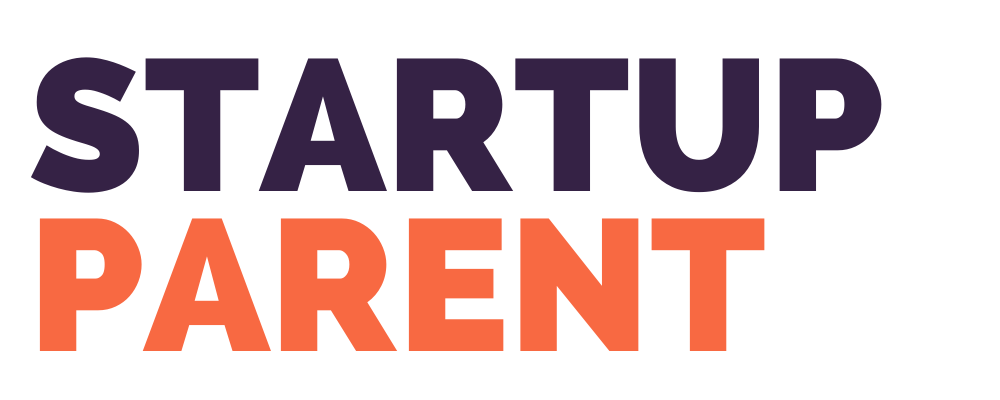Momfluencers: Inside The Billion-Dollar Industry of Instagram & Mommy Bloggers — Episode #211 with Sara Petersen
Momfluencers have taken social media by storm.
If you’ve ever scrolled and seen moms who talk about, write about, and share images and videos of their motherhood journey to inspire others, you’re not alone. All across the web, there are mothers who share picture-perfect images of motherhood, their adorable children, and relatable “tired mom” content, garnering millions of followers.
But what is a momfluencer, exactly?
According to Sara Petersen, researcher and the author of Momfluenced: Inside the Maddening, Picture-Perfect World of Mommy Influencer Culture, a momfluencer is someone who has monetized their social media presence using motherhood as the defining feature. This includes professional influencers whose livelihoods depend on their work, as well as everyday moms who perform their motherhood on social media to some extent.
Why do many people follow momfluencers & mom content so much?
For Sara, it’s all about the aesthetic. The first mommy blogs that she stumbled across were characterized by bright colors, gorgeous photography, and a representation of living in New York City with kids that was both idealized and relatable. Ultimately, it was the feeling of joy that sucked her in, even though she knew that it was mostly performance and pretty pictures.
Sara believes that we crave this performance of joy, especially if we were hoping to have a more joyful experience of motherhood. But the reality of motherhood, especially in the early years, is that it’s mostly labor.
It can be difficult to reconcile our own experiences of motherhood with the idealized images that we see on social media.
Despite the potential downsides of the momfluencer phenomenon, Sara believes that there is still value in the community that has formed around these women. For many mothers, social media can be a lifeline, connecting them with other women who are going through the same struggles and providing a sense of belonging.
According to her, being mindful of the reasons behind why we post and consume content on social media about motherhood can help us approach our own experiences with more intention, clarity, and maybe even a little more joy.
In this podcast, Sarah K Peck & Sara Petersen talk about:
- Sara’s discovery of mommy blogs, and how the performance of motherhood masks the labor of mothering (and the key distinction between the two).
- The rise of momfluencers, and the impact it has had on marketing, advertising, and content creation.
- The way certain aesthetics and image styling influences our perception, feelings, and expectations.
- What we need to do to adequately make space for all of the different experiences of motherhood.
- The importance of consuming and creating content with a critical eye, understanding the industry, trends, and money behind what might seem to be simple images and posts.
Listen to this episode of the Startup Parent Podcast:
To learn more about the captivating world of momfluencers, the money that flows when you’re a mommy blogger or an instagram poster online, and how you are also a piece of all of this online theater, listen to Episode #211 of the Startup Parent Podcast.
Listen to The Startup Parent Podcast on Apple ★ Spotify ★ Overcast ★ Castbox or wherever you listen to podcasts. Find another podcast player or the RSS feed here.
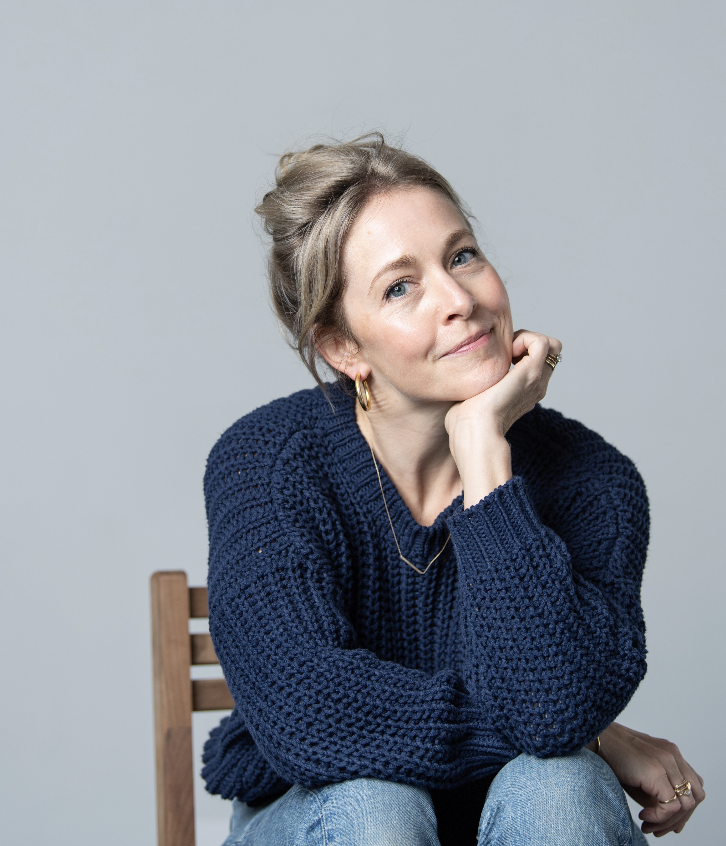
FEATURED GUEST
Sara Petersen
Sara Petersen is a writer whose essays about feminism, domesticity, and motherhood have appeared in the New York Times, Harper’s Bazaar, Washington Post, InStyle, and more. Her most recent book, Momfluenced, digs into how momfluencer culture impacts women psychologically, as consumers, as performers of their stories, and as mothers.
Where to find Sara Petersen:
Website | LinkedIn | Instagram
EPISODE SUMMARY
In this episode, Sarah and Sara discuss:
- The loss of identity in motherhood. Sara talks about feeling lost in her career and how she was seeking intellectual stimulation and adult time while home with young kids. She was drawn in by the beautiful aesthetics and abundance of joy portrayed in the photos of the momfluencers on social media.
- How social media misrepresents the labor of mothering. Online, motherhood is often portrayed as this idyllic, picturesque experience — but it is mostly invisible labor and can be physically and mentally exhausting. Sara discusses how motherhood is mostly labor and how it’s impossible to adequately prepare for it.
- How momfluencers came to be. Sara defines momfluencers as individuals who have monetized their social media presence using motherhood as the defining feature. The original monetization model for mommy bloggers was through banner ads, then brands started sending products in exchange for reviews or mentions, leading to sponsored content.
- What it means to perform motherhood. Sara talks about how social media has influenced our perception of motherhood because it shares a moment in time, not the full picture. She notes that all mothers on social media are performing motherhood to some extent, even if they don’t have monetized accounts or platforms.
- The power of momfluencers. The business of mom blogging has become increasingly competitive as more individuals enter the market, and momfluencers provide a significant amount of advertising and marketing for brands when they give companies access to an audience they’ve already built trust with.
- The moralization of motherhood. In America, there is a lot of emphasis on a mother’s innate ability to know what’s best and do what’s best and on a mother’s moral goodness and natural abilities to nurture and care for children. This is not only untrue, but believing that it is absolves society from providing mothers with the support they need.
- The danger of whitewashing motherhood. There are different experiences of motherhood, and the less we talk about them, the harder it is to understand. Speaking about our experiences of motherhood can help us feel less alone and more connected to other mothers. Understanding that there’s no such thing as ideal motherhood helps us step away from unrealistic expectations and accept our actual experience of mothering for what it is.
- Developing conscious consumption + creation habits. Understanding why we’re posting about motherhood, what we’re posting, and why we’re consuming things about motherhood can help us approach experiencing our own motherhood in a much clearer way. You can consciously opt in to the things that work for you, and opt out of what doesn’t.
Links and resources mentioned:
- Momfluenced: Inside the Maddening, Picture-Perfect World of Mommy Influencer Culture by Sara Petersen
- Sara’s Substack: In Pursuit of Clean Countertops
- Mother Brain by Chelsea Conaboy
- (Not) Getting Paid to Do What You Love: Gender, Social Media, and Aspirational Work by Brooke Erin Duffy
“The images are so still and serene and quiet. It’s hiding that motherhood is noisy, that it’s messy, and that it’s labor. It’s hiding that it’s labor because so much of this aesthetic imagery is wrapped up in a feeling of effortlessness.”
— Sara Petersen
CONVERSATION HIGHLIGHTS
Key ideas & supporting quotes from the conversation
There is no such thing as universally ideal motherhood.
“Every image you see of motherhood everywhere… you Google for them and you’ll find a woman with daisies in her hair, sitting in the grass, with long, flowing, naturally curly locks, her baby’s wearing a matching outfit, there’s this perfect picnic basket and you’re like, ‘oh.’ And it evokes this feeling like that’s what motherhood supposed to be like. And then I’m like, my tears are blending with my sweat and I’m like, peeing myself on my end of it, and I smell so bad. And my kid has like, diarrhea or vomit on them and I just I can’t even control my anxiety with how much cleanup there is to do every day. Like I came in this morning, and there was so much to pick up and I just started furiously running around and picking stuff up. And then I was like, ‘you have to stop. You will not clean the house before you go to work. That’s impossible. You know this is impossible. Pick one thing to clean and then drop it.’ And it’s just so different.”
“[The] ideals of motherhood were not created for you. They were created by usually white men in power who had a vested interest in creating those ideals. And they are creations… they’re not innate truths, and everybody has to figure out their own ideal of motherhood. And that’s really hard. And I think that’s why consuming momfluencer content is such catnip for so many of us — because it’s really really forking hard figuring out like, what matters, to what makes your day better as a mom. But yeah, we all have to do that ourselves. And yeah, that there is no such thing as an ideal of motherhood as a universal ideal.”
The concept of ideal motherhood wasn’t created to support mothers.
“There’s a really dark, eugenesis history of what an ideal mother should be and why she is supposedly equipped with all the innate nurturing skills and mothering skills. If we go back to like the cult of domesticity, it was following the industrial revolution when the separate spheres were sort of created. There was the market sphere where the men were, and there was the domestic sphere where the women were. It was really deliberately created to keep white upper class women in the home, and to idealize home as this moral center where a man could escape the filth of the marketplace and come home and be grounded by morality and by calm — and the white upper class woman was set up as the angel of the house. And this also deliberately left out many women of color, many working class women, who for financial reasons, and for reasons rooted in racism, could not afford to spend all day at home teaching their children Bible verses and arranging flowers and providing respite for the husband when he got home at the end of the day.”
“From that historical standpoint, white women have been valorized. White women of a certain class have been raised up on a pedestal, while being given no institutional support or meaningful agency in the world. But they have been raised up as these paragons of virtue to aspire to, and this was done really deliberately to distinguish between white women who should be protected and should be idolized — and everyone else who should not. And it would be okay if the working class woman was working completely inhumane hours in inhumane factory conditions. It’s okay because she doesn’t qualify to be a ‘good mom.’ So I think the more we look at where these ideals of ‘good motherhood’ come from, it becomes really clear that it’s always coming from white men in power, trying to disempower marginalized communities.”
The labor of mothering is relentless.
“I am not a huge fan of the tiny kid phase. Like of course they’re adorable and smushable when they’re tiny. But it’s so autonomy robbing. It’s so physical. It’s so, you’re so tied to routines and schedules. And you, and the effort of always being one step ahead is really exhausting in a way that’s hard to quantify before you have children. At least it is for me and yeah, I had thought that motherhood was going to be this like, you know, this beautiful, defining part of my life and it’s in many ways it was, but the day to day reality of it was, I was just not prepared for the day to day labor of motherhood, or mothering, which is so different from like, the ideals of motherhood so many of us are taught to chase.”
“It requires so much mental strength, even that little dialogue you just had with yourself. You constantly have to have those like inner dialogues like ‘okay, what am I capable of in this moment? What am I not capable of?’ You know, ‘what’s useful, what’s not useful?’… the relentlessness of it is just something that I think is impossible to prepare for.”
“You never get a break. I do not… this one is so hard to communicate. There’s just no reprieve. And I always — you know, I’m using sports metaphors again — but like, even Michael Phelps swims six to eight hours a day, but he doesn’t swim 24 hours a day. And there’s not like, I mean, actually his coach might wake him up in the middle of the night. I don’t know. But for the most part, they’re not waking you up overnight. They actually think that rest is important.”
“When you see a beautiful image of mother and child, that is not an image of mothering, that just that’s just an image. I think just always remember that what we’re consuming about other people’s motherhood, it’s a picture of motherhood, it’s not a reflection of [the actual labor of] mothering.”
— Sara Petersen
If you post about motherhood on social media, you’re also influencing — you are also part of the performance of motherhood.
“We’re all performing motherhood. I think this is such a critical point because even just establishing like, ‘oh influencers and momfluencers, they’re the ones that are performing motherhood, but I’m not.’ That’s an interesting divide — ‘and they are being financially compensated for it.’”
“To some extent, we are all performing motherhood all the time, whether or not we’re conscious of it. You know, I’m performing my motherhood when I go to preschool drop off versus when I’m alone in the grocery store and I’m not performing my motherhood I’m and that we are performing these things because we have been upheld to specific ideals of motherhood and these ideals of motherhood were not created by women or mothers or anyone that knows anything about the labor of mothering.”
“Seeing this other person who just seemed like holy shirt, motherhood was everything and she was able to be her truest, most authentic self. Even though a lot of me was saying ‘no, no, that’s just not you — it’s just pretty pictures,’ it got into my subconscious in ways that I don’t think I realized until later on, and I do think, I thought on some level that that type of just totally fulfilling maternal identity was possible for me to attain or achieve or aspire to.”
Social media captures an aesthetic with snapshots of motherhood, but it does not reflect mothering.
“[Naomi Davis’] blog was just this like, really, aesthetically beautiful, at least to me. Like bright colors, this really gorgeous representation of living in New York City with kids. Her photography was really great like these gorgeous you know, close up shots of the kids and their freckles. And they just always seem to be going on like adventures, like, you know, tromping through the Upper West Side. Like one baby strapped to our one in a stroller. And just like everybody’s grinning ear to ear and it was just the abundance. of joy that really sort of, I think sucked me in. Because at the time I had a baby and a toddler. And I was very lost in terms of vocation at that point.”
“So I’m just feeling sort of lost in my career, I’m a stay at home mom, like that was, you know, my sole work was childcare and domestic labor. And so finding this person who seemed to derive so much fulfillment and joy and pleasure from motherhood was like just so far from my reality at that point, and it became this sort of… on one hand, I was like, I don’t think this is possible. I think this is mostly performance, and I think this is mostly pretty pictures. But on the other hand, there was something so infectious and addictive about her performance of joy that I kept following and I kept sort of thinking to myself, ‘I can have more joyful experience of motherhood, I just need to change something about me, or about the products that I buy, or about my kids, or about my home’ like, I didn’t know what it was, but I just kept following along and thinking to myself, ‘something’s got to give here.’”
Momfluencers get paid for content creation, not for the labor of mothering.
“I also want to make the point that momfluencers who have monetized their accounts, they’re not being paid for the labor of mothering. They’re being paid for content creation. They’re being paid for their photography skills, their marketing skills, their business skills, they are not being paid for the labor of mothering. And I think that’s such an important distinction to make, because I think often we can get a little into MLM territory where it’s like, ‘oh, but it’s awesome. They’re getting paid for the unpaid labor of motherhood,’ but they’re not. They are getting paid for something else. They still, like all of us, have to figure out childcare and cobble together absurd paid leave situations when there’s no universal paid leave.”
“The labor is significant. I mean, I talked to so many women who just walked me through what they have to do, like, sometimes you have to write the script. Sometimes you have to come up with the whole concept of the ad like entirely on your own. You know, oftentimes, because the quality standards are so high, you have to hire a videographer. You have to hire hair and makeup. Right? It’s like a significant amount of work, and it’s skilled. You have to be good at these things and not everybody is.”
“There were many parts of early motherhood that I just did not enjoy, frankly. And I just craved more intellectual stimulation. I craved more adult time. I just craved more time for me to be myself outside of motherhood.”
— Sara Petersen
QUOTES FROM THE EPISODE
Excerpts from the transcript of the conversation
Sara Petersen: “There were many parts of early motherhood that I just did not enjoy, frankly. And I just craved more intellectual stimulation. I craved more adult time. I just craved more time for me to be myself outside of motherhood.”
Sarah K Peck: “How do you describe to someone how sweaty motherhood is? Pushing a stroller is a lot of work… traveling with the baby is like traveling with an animated kettlebell. Would you like to carry a 35 pound kettlebell without putting it down for six hours — and it’s a Harry Potter Quidditch style kettlebell. It’s a like this moving, flailing thing that occasionally punches you in the lip and then it pees on you in defiance.”
Sara Petersen: “It’s very clear to see how this has carried on through today. Because if we view motherhood as this essentialist thing, that women are biologically meant to be mothers, that they’re biologically good at mothering, then yeah, we don’t need to offer them support. We don’t need to give them paid leave. We don’t need to give them equal opportunities in the workplace because a good mom should be at home. Her unpaid labor should support capitalism. If you look at almost every aspect of the labor of mothering, it is not supporting the people doing it. It’s supporting somebody else.”
Sara Petersen: “It can be hard to locate your own value your own maternal values and your own maternal needs when you’re just constantly experiencing an onslaught of external voices.”
Sarah K Peck: “the fact that we’re all performing was one of the mind-blowing things because it’s like, yeah, I am performing when I post a picture. Who is it for? What am I trying to say? What do I want them to think about me? What do I want to think about me, right?”
Sara Petersen: “It’s okay if you’re doing it for external validation, but even just, I think there’s so much power to be had from just the knowledge and the self awareness that yeah, that’s why I’m doing it. I want a quick dopamine hit.”
Sara Petersen: “The more we look at where these ideals of ‘good motherhood’ come from, it becomes really clear that it’s always coming from white men in power, trying to disempower marginalized communities.”
“How do you describe to someone how sweaty motherhood is? Pushing a stroller is a lot of work! Traveling with the baby is like traveling with an animated kettlebell. Would you like to carry a 35 pound kettlebell without putting it down for six hours? It’s a like this moving, flailing thing that occasionally punches you in the lip and then it pees on you in defiance.”
— Sarah Peck
GRAPHICS
If it resonates, share this episode and feel free to share these graphics.
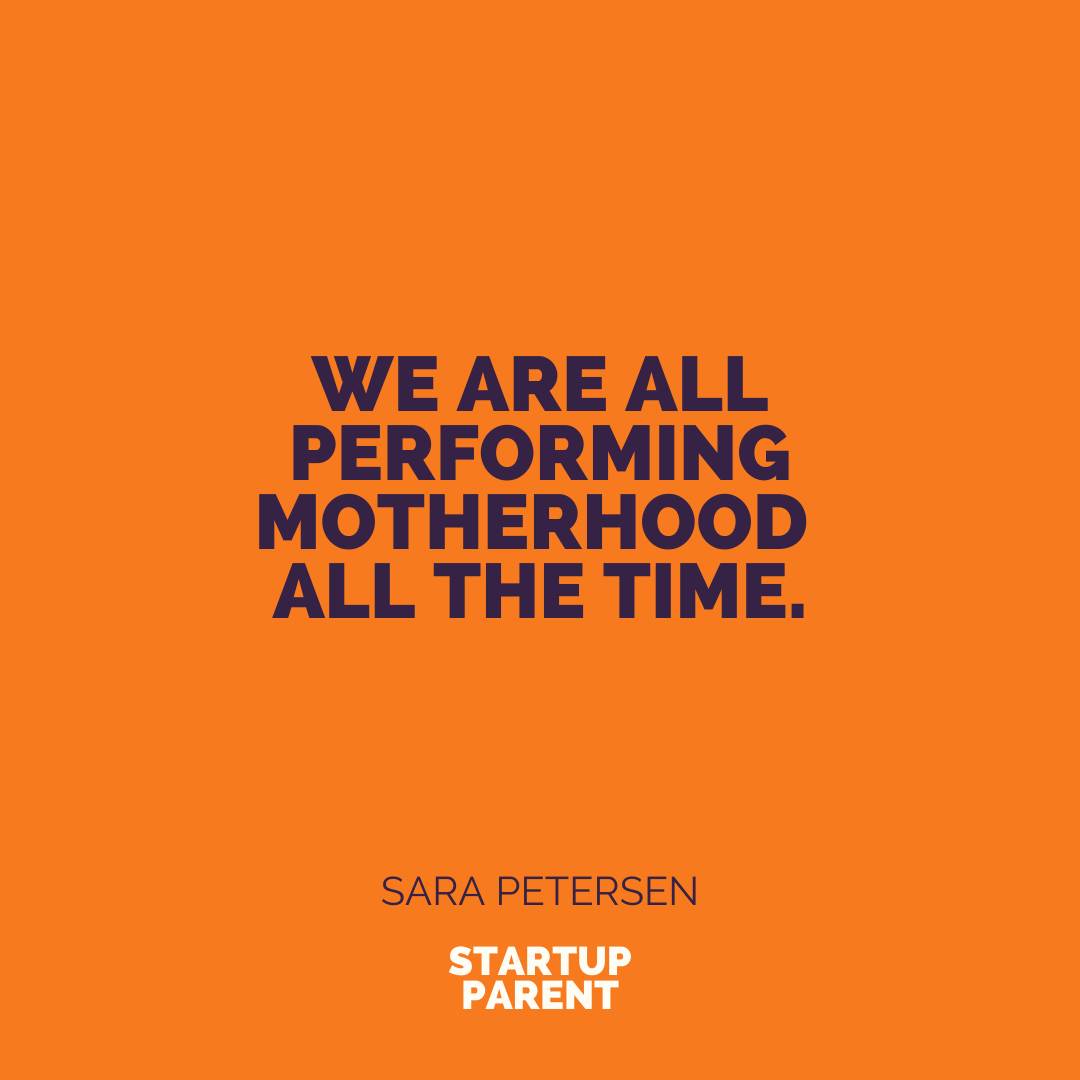
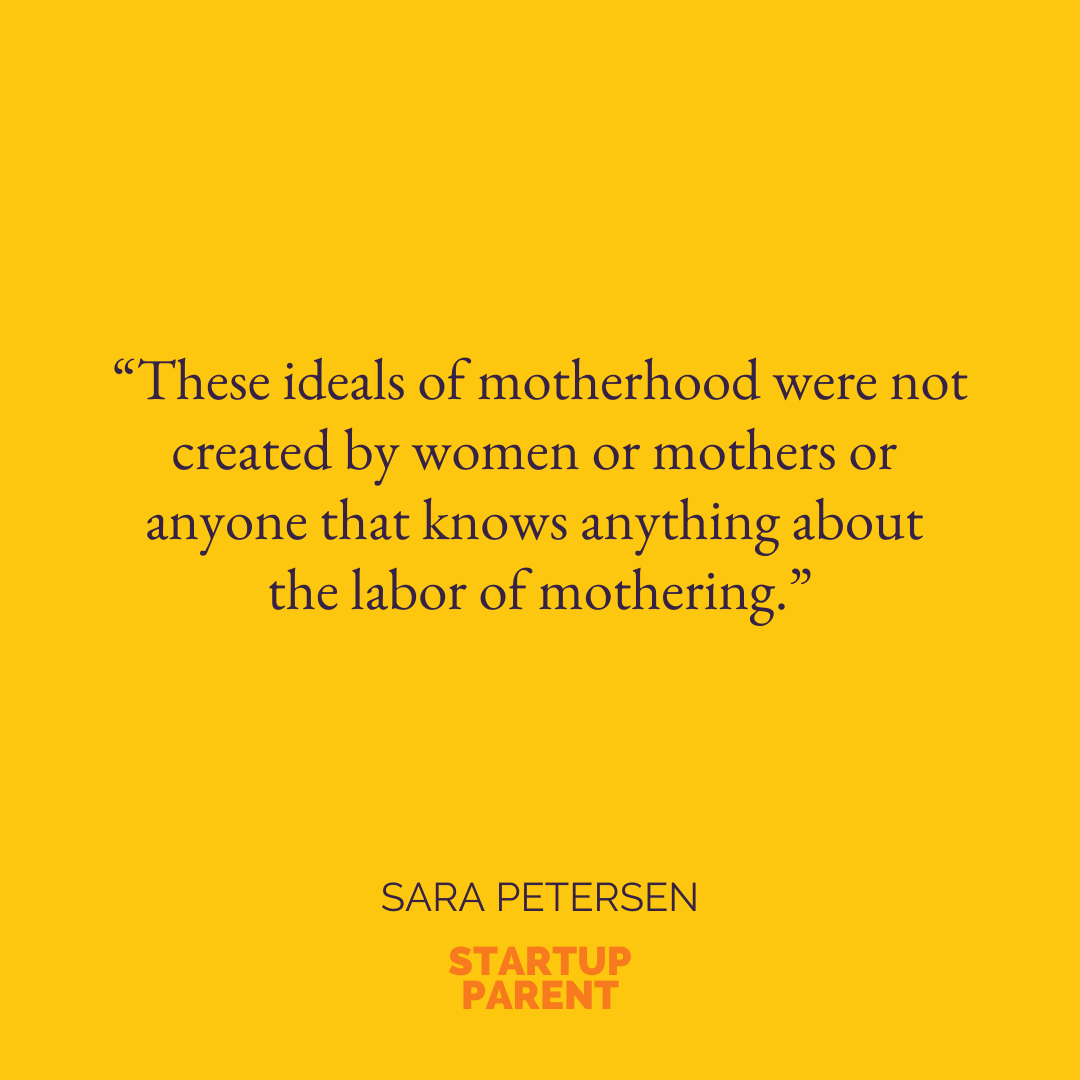
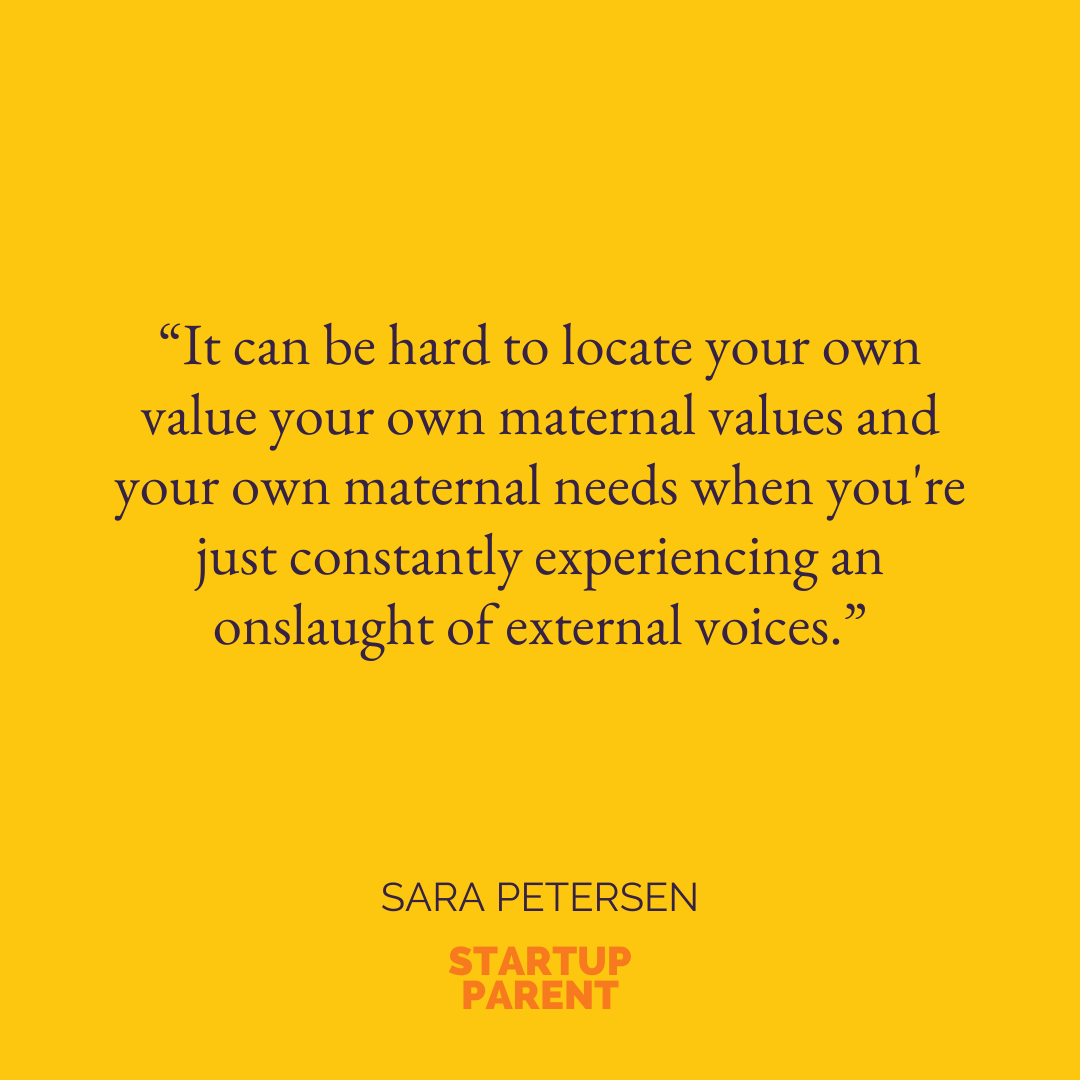
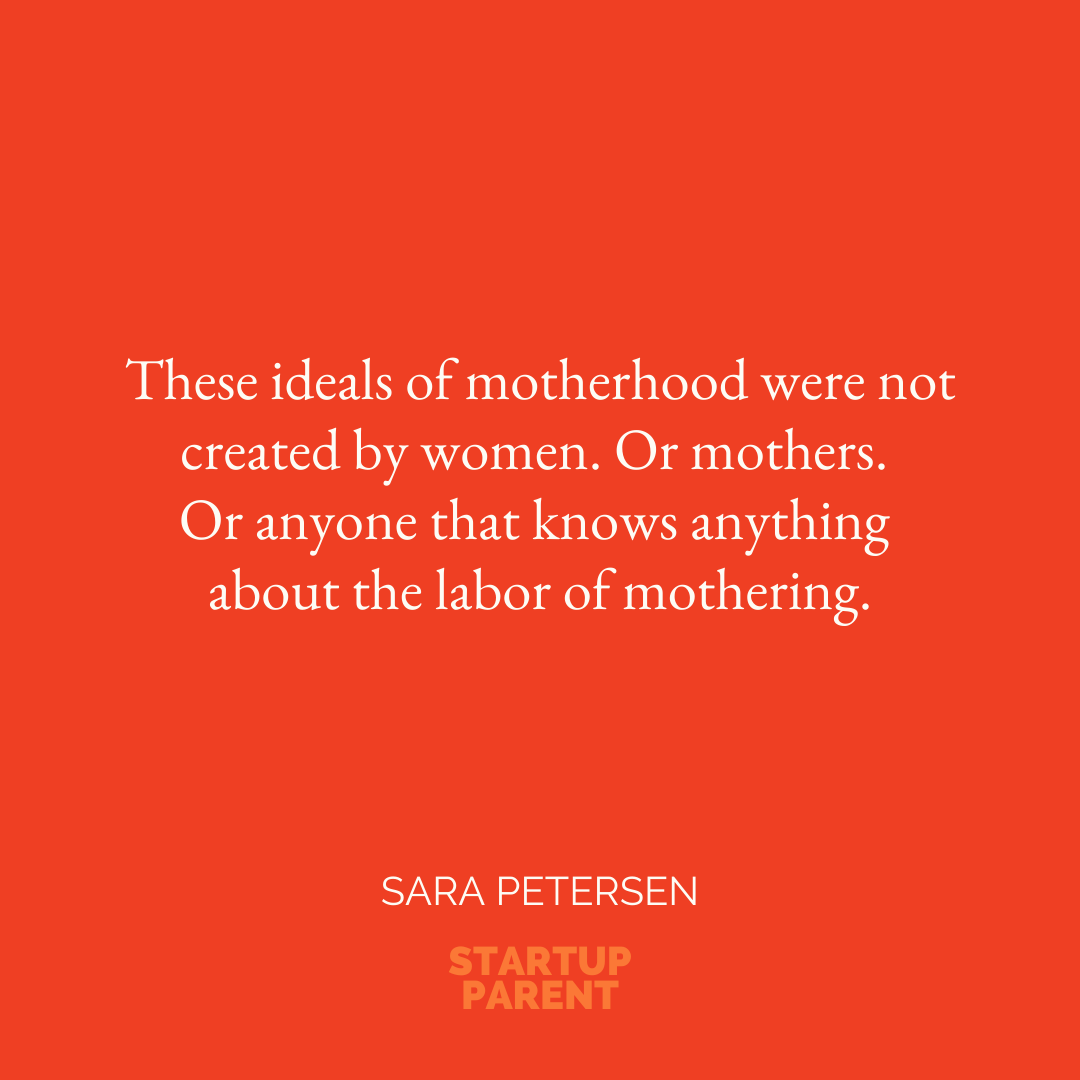
Listen to The Startup Parent Podcast on Apple ★ Spotify ★ Overcast ★ Castbox or wherever you listen to podcasts. Find another podcast player or the RSS feed here.
ABOUT THE STARTUP PARENT PODCAST
If you're growing a business, leading a team, or figuring out entrepreneurship and you have kids, this podcast is for you. We go in-depth with founders and entrepreneurial parents about what it really takes to have babies, grow businesses, and get a little bit of sleep. Sign up for the newsletter to get new episodes in your inbox. And leave us a review on iTunes.
Listen to The Startup Parent Podcast on Apple ★ Spotify ★ Overcast ★ Stitcher ★ Castbox or wherever you listen to podcasts. Find another podcast player or the RSS feed here.
